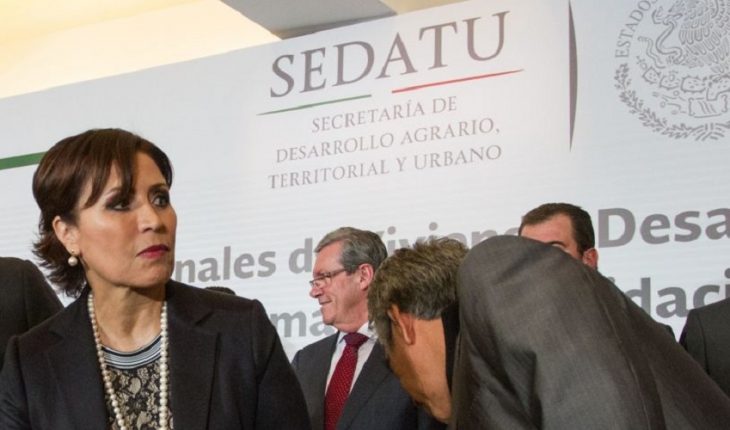The Secretariat of the Civil Service (SFP) considers as “non-serious fault” the alleged diversion of more than 4 billion pesos of the Sedatu allowed by the major exoficial, Emilio Zebadúa, as set out in the Report of Alleged Administrative Responsibility integrated on September 1.
While Zebadúa seeks legal pardon by offering himself as a collaborating witness of the Attorney General’s Office of the Republic (FGR) to deliver evidence incriminating his ex-wife, Rosario Robles in The Master’s Scam, he also faces an investigation by the Internal Control Body (IPO) of the Sedatu – in charge of the Civil Service – along with 24 former civil servants most involved in the possible diversion of public resources during the past six years.
Read more: Zebadúa negotiates pardon, as he fights in court for his property
However, the IPO considers that Zebadúa had only “non-serious faults”, such as the failure not to “supervise” its underlings, even though it was responsible for managing the resources of the Sedatu, the legal proxy of the bank accounts and direct head of the team that signed the money outing, as explained in the PA-13/2020 public service file obtained by Animal Politics.
The corresponding penalties for “non-serious misreliable” consist of public warning, suspension of employment or disqualification for at least three months and but less than one year, under section 75 of the Administrative Responsibilities Act.
In contrast, in another investigation against Rosario Robles in 2019, the Civil Service sanctioned her with 10 years of disqualification for omitting to report on a bank account with a balance of just under 3,000 pesos in her last estate statement when she was a public official.
The Report of Alleged Administrative Responsibility dated 1 September 2020 confirms that zebadúa’s Senior Officer paid agreements with public universities for services that were not met with money from budget items that were to be used only for infrastructure and compensation for expropriation of property, which involved “likely property damage” to public coffers, among other alleged irregularities.
This is the follow-up to seven investigation files opened since 2018 for alleged irregularities in the Sedatu, but the SFP this year only determined what administrative faults the 25 former public performers allegedly incured.
This investigation, which is now in the stage of hearings for those identified to present their defence arguments, is carried out by Miguel Angel Serrano Sánchez, holder of the Responsibilities Area of the Internal Control Body of the Sedatu, who was also in charge of determining the type and severity of the alleged irregularities committed by each official.
Serrano Sánchez was supervising lawyer of the contentious at the OIC of the Sedatu from 2016 to 2017, but rose in this administration. In his former post he was accountable to Miguel Angel Vega, then holder of the OIC of the Sedatu and before Sedesol, who did the investigation at Sedesol in which he determined that there were no irregularities in the conventions of The Master Scam, which are now part of criminal investigations. Vega García is now ceo of Anticorrupción y Transparencia at the Contraloría de Veracruz, in the government of Cuitláhuac García.
Animal Politics consulted the Civil Service on the reasons for determining that Zebadúa committed only non-serious misdeeds, but replied that this is an ongoing investigation and procedural stealth must therefore be respected.
The alleged 2.3 thousand mdp detour in Sedatu
Emilio Zebadúa was a senior officer in Sedesol and Sedatu, the second most important position in a unit only after the holder, because he is responsible for executing the public budget and, in this case, depended directly on Rosario Robles in both secretariats during the past six years.
The Financial Intelligence Unit denounced him, along with two of his brothers; Rosario Robles and her former office chief, Ramón Sosamontes, for alleged money laundering before the Attorney General’s Office (FGR) in August 2019.
Unlike Rosario Robles who was not found by the UIF for million-dollar expenses, brothers Emilio, José Ramón and Lourdes Zebadúa spent 205 million pesos, without the amount corresponding to their income. These were payments for inputs through credit cards, purchase of real estate, international transfers and casinos.
Despite this, there is a possibility that Zebadúa will be forgiven if the FGR gives him the benefit of “opportunity criterion”, that is, to be testicollaborating to indict Rosario Robles, who already faces an order of apprehension for organized crime and money laundering.
According to the investigation of the Civil Service, which is only in charge of the administrative part, Zebadúa violated the Law on Property Responsibility, failed to comply with regulations of the unit and “in accordance with irregularities, the alleged perpetrator would have caused property damage to the Sedatu” for 2 billion pesos handed over to alleged service providers and one billion pesos to pay the agreements with universities.
But in determining the type of liability that would be imposed on it, the IIC determined that it would have failed to comply with article 49 of the General Law on Administrative Responsibilities concerning a “non-serious administrative misconduct”, when “the public servant whose acts or omissions violate discipline and respect for other public servants and supervise their subordinates”.
Although the Law on Responsibilities does provide for the diversion of public resources in Article 54, for the “public servant who authorizes, requests or performs acts for the allocation or diversion of public resources, whether material, human or financial, without legal basis or in contraposition of the applicable rules”, Zebadúa was not referred to against Zebadúa.
Even though the irregularities detected by the Public Service include the millionaire payment for agreements made with public universities to make alleged services, but which in turn outsourced to companies that were actually ghostly and, therefore, public money disappeared, as revealed by the journalistic research The Master Scam.
In addition, the resources were delivered in a fiscal year other than the date on which the agreements had been signed. Between 2016 and 2017, the Senior Officer delivered 617 million pesos despite the alleged agreements being signed in previous years.
This means a violation of the Law on The Law, as commitments made by a unit in a fiscal year must be paid in the same period. In any case, if the unit is to pay off a debt from a previous year, it had to ask the Treasury for authorization, but in this case Zebadúa did not.
“They were made without the authorization of the Treasury, which had to determine the accounts payable that could be paid by the Federation Treasury during the debit period of previous fiscal years, which were to be registered in the federal financial administration system of the Secretariat itself, in contravention of the Federal Budget Law,” says the Civil Service in the Report.
Zebadúa also allowed Francisco Báez, his immediate subordinate, to make 76 payments to service providers for 2 billion 343 pesos corresponding to the agreements signed in 2015, 2016 and 2017.
But such payments “would have been unjustified”, since “there would have been no evidence to prove the existence of legal documents such as duly signed agreements, justifying the obligation to make the payment”; there were also no documents crediting that the services and goods were actually carried out and delivered to the Secretariat.
“So the alleged person responsible for his performance as Senior Officer with his omissions would have resulted in service providers being unjustifiably paid the amount of 2 billion pesos,” concludes the Public Service Report.
To pay for agreements with universities, the Senior Officer also used the money from budget items 33901, 33903, 39402, 43101 and 32201 and bank account R15 410 Sedatu Concentrator Infrastructure which, according to the expenditure classification, is only used for the payment of leases of buildings, outsourcing of services with third parties, comprehensive services, compensation for expropriation of premises and production subsidies.
“With his omissions, the alleged perpetrator would have failed to detect and prevent the use of the resources allocated and the powers conferred on that Senior Officer, solely for the purposes for which they are affected; this also results in 940 million pesos of property damage to the Sedatu, the erogation of which was undue in being used for purposes other than those that were effected,” says the Public Service.
From February 15, 2016 to July 17, 2017, Zebadúa would have failed to monitor and evaluate the functioning of the Directorate-General for Programming and Budgeting, (in his charge) and omit to intervene in the authorization of the erogations from the approved budget with what would have led to staff in charge of Francisco Báez, such as Martha Lidia Montoya , Director of Treasury; Juan Pablo Ramírez García, Deputy Director of Reali Funds61 payments were made under the agreements concluded in 2015, 2016 and 2017.
This “would have been unjustified whenever payments were made there was no certainty regarding the conclusion of the agreements and the provision of services, so with their omissions it caused public servants to pay unjustifiably,” the Public Service warns.
What we do at Animal Politics requires professional journalists, teamwork, dialogue with readers and something very important: independence. You can help us keep going. Be part of the team.
Subscribe to Political Animal, receive benefits and support free journalism.
#YoSoyAnimalEl the Public Service office considers ‘non-serious misconduct’ the alleged detour millionaire in Sedatu first appeared in Political Animal.





